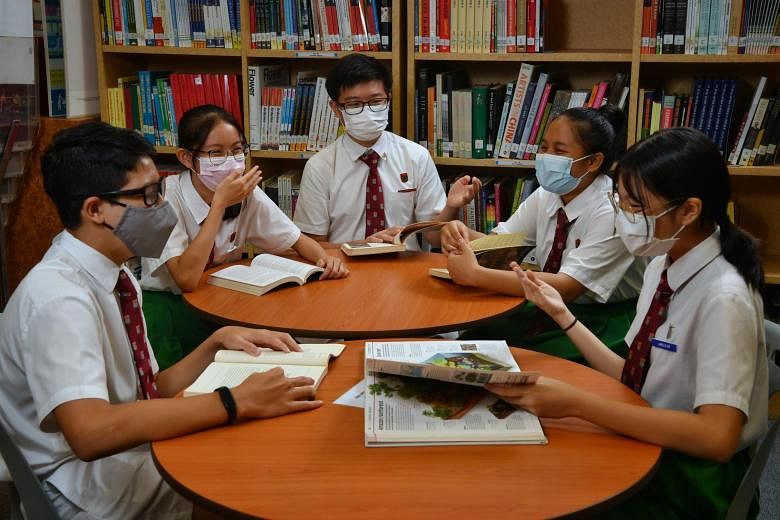SINGAPORE - Express or Normal (Academic)?
After getting his Primary School Leaving Examination results, Jonas Ng was faced with a choice that would seemingly decide his whole future.
"I preferred the slower pace of lessons in the Normal (Academic) course, but also wanted to stretch myself in subjects I was strong in," said Jonas, now 15.
Then, he learnt that Gan Eng Seng School would be one of the schools piloting full subject-based banding (SBB) in 2020 for the Secondary 1 cohort, and decided to apply to the school.
He felt it would be having the best of both worlds.
Under full SBB, students from the Express, Normal (Academic) and Normal (Technical) streams are placed in the same mixed form class and take six non-academic subjects together. Known as common curriculum subjects, they include art, physical education, and food and consumer education.
For subjects like English, mathematics or history, students will attend lessons in different classes based on their ability for each subject.
This means students who perform well in certain subjects would be able to take them at a more demanding level in the middle of the year or the following year.
Jonas, for instance, was among the top Sec 1 scorers in geography from the Normal (Academic) stream and went on to take the subject at the Express level in Sec 2.
"I'm very interested in geography, so I felt really happy to take it at a more demanding level," said Jonas, who is now in Sec 3.
His mother, Madam Fion Farn, 44, a manager, said this was a big boost to his confidence.
"Now that he knows he has his strengths, he is motivated. Interacting with students who are better (in the subject) also helps to motivate him. The environment helped to build his confidence," she said.
She said full SBB has helped students from the Normal (Academic) stream, like her son, find their niche.
"Some of the students from the Normal (Academic) stream are very hardworking and focused. We should do away with the old thinking that they are lazy or not interested in studying. It is a matter of finding their strengths and interests," she added.
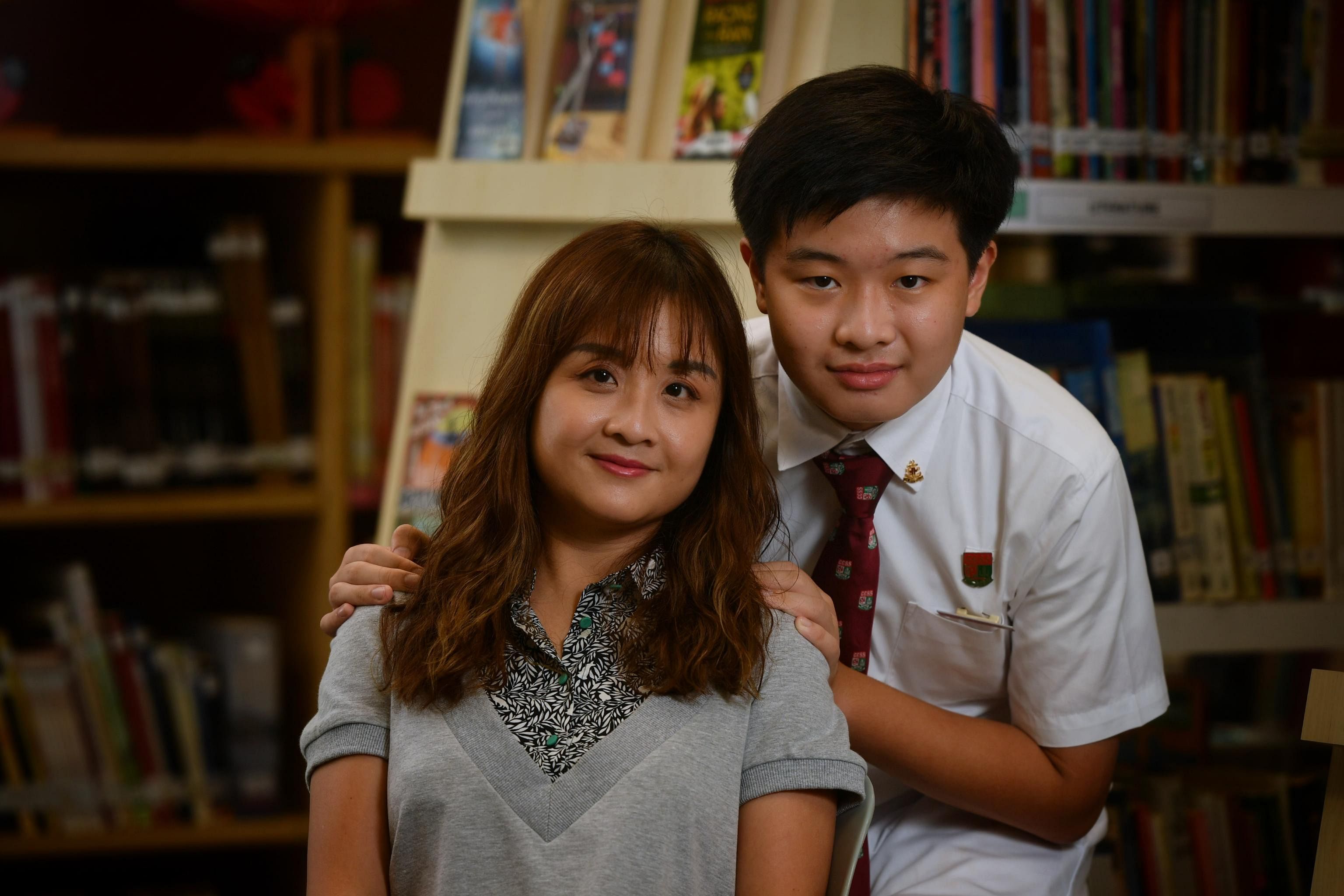
Last week, Education Minister Chan Chun Sing announced that by next year, about 90 schools, or more than two-thirds of secondary schools, would have implemented full SBB.
When full SBB is fully implemented in secondary schools in 2024, there will no longer be Express, Normal (Academic) and Normal (Technical) streams.
Students can take subjects at three levels - G1, G2 and G3. G stands for General and the levels are broadly mapped from today's Normal (Technical), Normal (Academic) and Express standards respectively.
Gan Eng Seng School's journey to customised learning for its students
The school started preparing for full SBB in June 2019 by inviting two former students from the Normal (Academic) and Normal (Technical) streams to share their school experiences.
The former student from the Normal (Technical) stream said he felt that the general expectation of students taking the Normal (Technical) stream was not very high, recalled Gan Eng Seng School vice-principal Sara Selva.
He also felt that certain kinds of behaviour seemed to be tolerated, as students from the Normal (Technical) stream were perceived to act in a certain manner.
Mrs Selva recalled: "He shared that it was quite a painful experience to think that others felt that about them."
Calling the sharing experience an eye-opener, she added: "Moving forward, we had to address the issue."
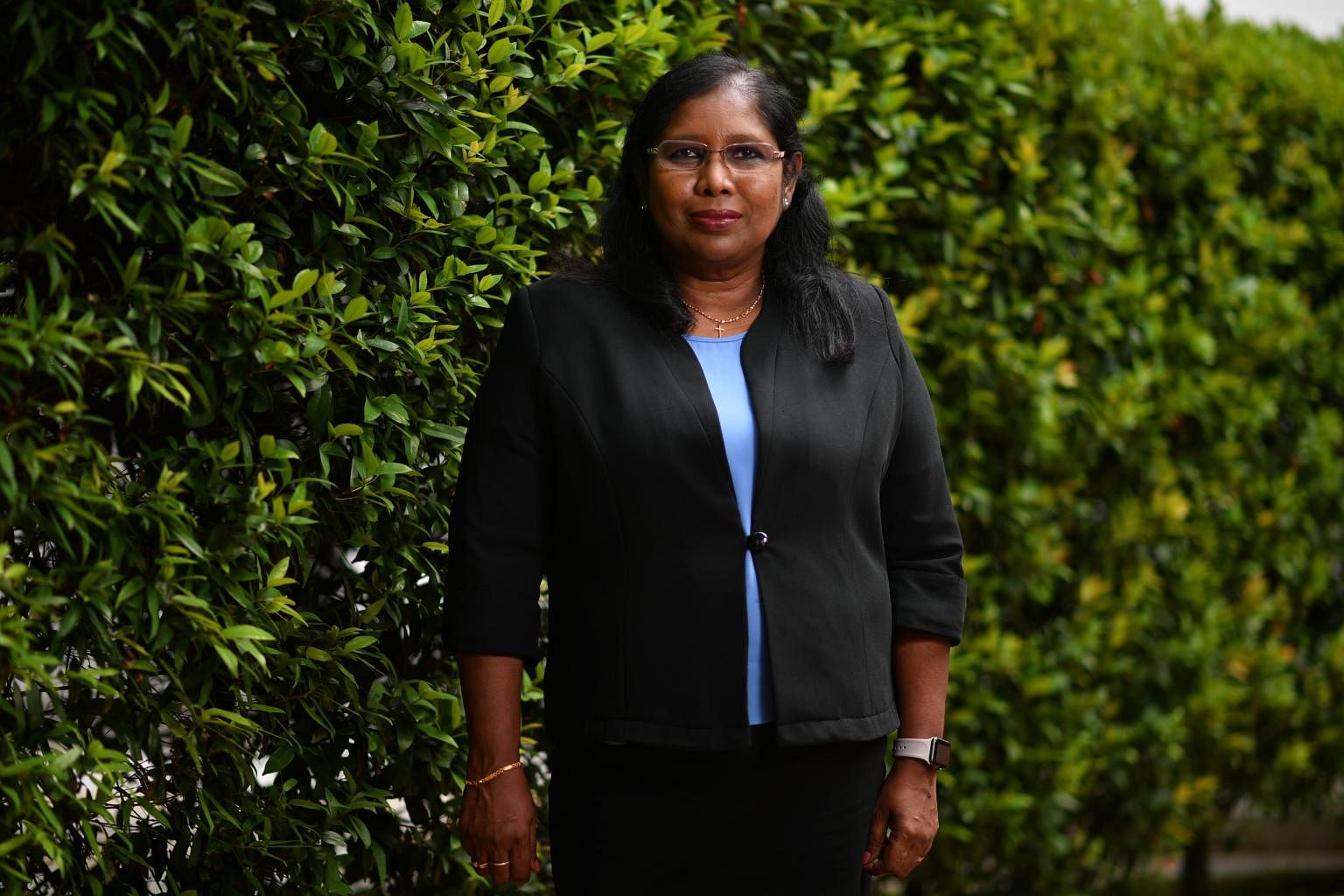
With that as a starting point, the school went about planning for the implementation of full SBB.
In December 2019, teachers took a vote on whether form classes should include a mix of students taking the Express and Normal (Academic) courses; both the Normal (Academic) and Normal (Technical) courses; or all three courses.
All voted for having three streams in a class.
This model, however, made planning the timetable a huge challenge.
Compounding this was the fact that the school had decided to give each child a personalised timetable "so that it is not so obvious which stream they came from", said Mrs Selva.
The timetable went through several iterations before roll-out.
"It was a lot of work, with different timetables for different combinations. It was tedious, but we did it," she said.
Teachers known for their capacity to build strong rapport with students were asked to lead the first batch of students. They attended workshops on how to conduct lessons with differentiated instructions, to engage students of varying abilities in their classes.
More classrooms had to be created for the full SBB classes. One room came from the alumni, who fully supported the programme and gave the use of the alumni room in the day for lessons.
Classes were also renamed to remove identifiers with particular streams, Mrs Selva said.
Wider network of friends with diverse strengths
Tang Hui Xian, a Sec 2 student from the Normal (Academic) stream at Gan Eng Seng, said she was surprised to find out that her form class consisted of students from different streams and she was initially afraid she would not be able to mix well with them.
"I am not a sociable person and it is difficult for me to make new friends. I was worried that I wouldn't be able to communicate with those from other streams," said the 14-year-old.
She eventually realised it was not that difficult to make friends from different streams, as they attended classes such as art, design and technology, and food and consumer education together.
Taking maths and geography at the Express level has also helped her to make friends from the Express stream.
"If I don't understand a question, I usually ask my friends who take mathematics and geography with me and they always help me," she said.
"I feel very fortunate to have friends from different streams. We help one another."
Puteri Ellyanti, a Sec 2 student from the Normal (Technical) stream, said she liked being in a mixed form class despite her initial reservation, as there were just five students from her stream out of 37 students in her form class.
She is close to three classmates from the Express stream and they often hang out together during recess, she said.
"I like having friends from different streams. If I don't know anything, they can teach me," she added.
Puteri has been taking Malay Language at the Normal (Academic) level and hopes to be able to take more subjects at a more demanding level to challenge herself.
The help goes both ways as students from the Express stream find themselves learning from their friends from the other streams.
Sec 2 student Raouf Bamadhaj, 14, from the Express stream, said full SBB has helped him widen his circle of friends.
"I'm quite shy and will try to stick to my circle of friends. During recess now, students from different streams sit together. It wouldn't have been possible for me without full SBB," he said.
He has also sought help from his classmates from other streams.
A classmate once drew a lifelike dish of chicken rice and sugar cane drink, and he asked her for tips on using different colours and techniques.
"She shared them with me - but no, my drawing didn't improve after that," he chuckled.
Doing away with standard worksheets and old teaching styles
Maths teacher Sultan Shah has had to review and tweak his old worksheets for his classes since the school started offering full SBB.
With some students in the Normal (Academic) stream taking maths at the Express level, his class is now more "heterogeneous", said Mr Shah, who has been teaching for five years.
His worksheets are now designed to engage the mix of students.
Two out of five questions may be basic, for instance, while others may be more challenging questions that he would guide some students with - even as others tackle everything on their own.
"Full SBB has forced me to consider teaching the same topics in different ways," he said, adding that he has benefited as a teacher, as he now has a wider repertoire of teaching strategies.
The same goes for English language teacher Chandrima Roy, who has come up with multiple ways for students to present their learning.
For instance, some might write an essay, some might like to do an audio recording, while others might like to write it as a letter with drawings.
"If we give them the option of presenting their thoughts in multiple ways, it makes it easier for them to learn," she said.
Mrs Roy, who also teaches character and citizenship education, one of the common curriculum subjects, said she has seen her students become more inclusive.
"They have become more appreciative of the diversity in the classroom. They can accept the fact that someone might be different."
Mrs Roy, who has been teaching for 31 years, added that not only has full SBB done away with labels that might be demeaning to the students, but it has also resulted in greater camaraderie in the class and empathy among students.
She recalled a heartwarming incident in which a student did well enough in English to move from offering it at the Normal (Academic) level to the Express level in the middle of the year, and the whole class clapped and cheered for their classmate.
Year head and physical education teacher Clarence Loh, who has been teaching for 15 years, observed that the blurring of streams is evident as students form friendships that are not based on academic ability.
"Structures drive behaviour. Now, with no more streams per se, students look at one another as individuals and enjoy being with one another because of common shared interests, instead of being bound by academic ability," he said.
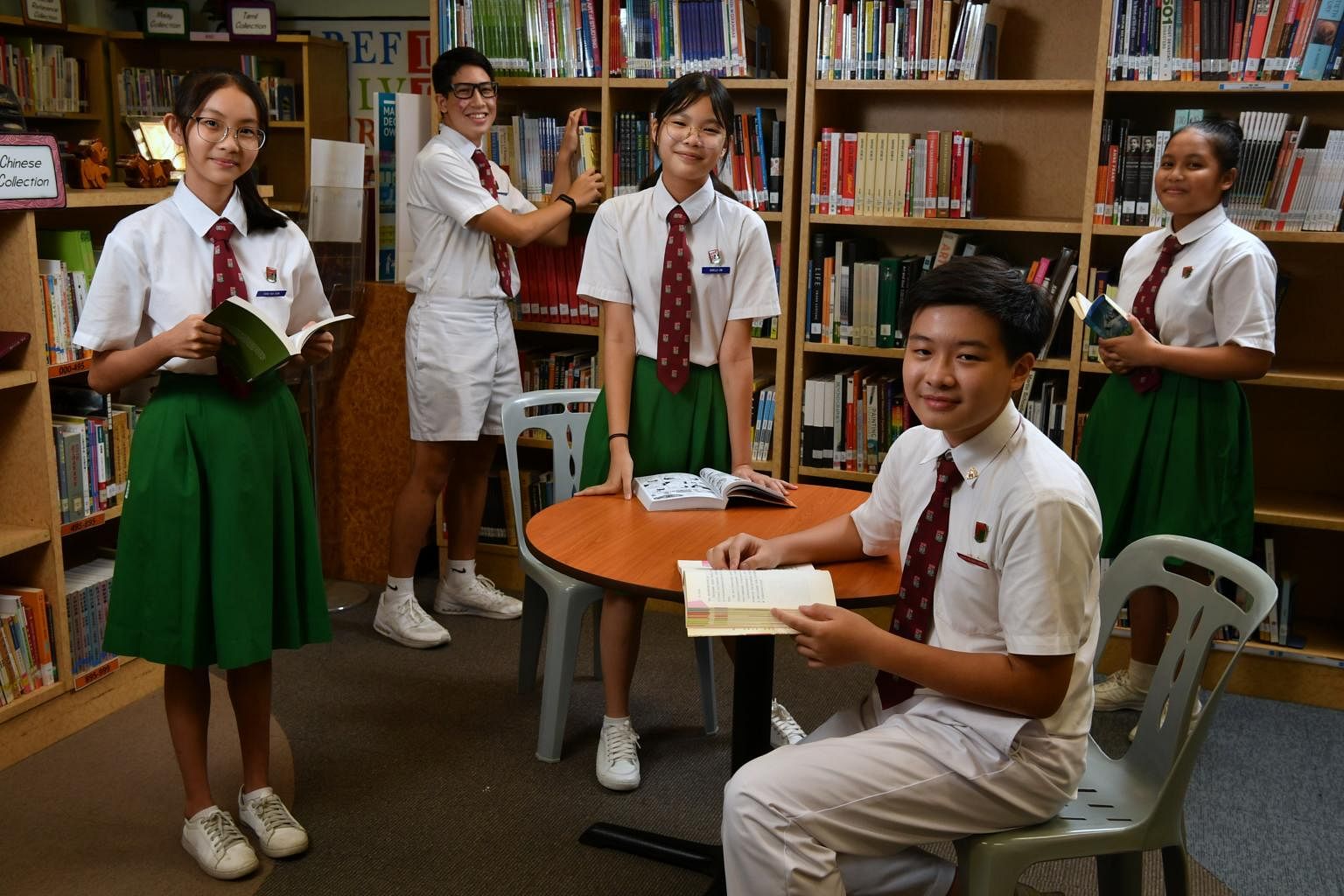
Benefits outweigh challenges
Full SBB may have entailed more challenges in timetabling and required teachers to adopt a diverse range of teaching methods, but Gan Eng Seng School's teachers say it has been worth the effort.
Mrs Selva, the school's vice-principal, said full SBB does not pigeonhole students by their abilities.
"It gives students hope that if I am in the Normal (Technical) stream, it doesn't mean I'm stuck there.
"If I'm good at art, I can offer Normal (Academic) art. If I'm excellent, I may be able to offer Express art, which is an opportunity that the students never had in the past," she said.
Another positive by-product of full SBB has been the improvement in the discipline of the students, several teachers said.
School attendance, behaviour and discipline are less of an issue now compared with before, they said.
Students have the chance to pick up learning norms in mixed classes, noted design and technology teacher Serene See-Toh, who has been teaching for 19 years.
"Maybe they were exposed to a rowdy classroom in the past and thought that was the norm, but in a mixed class, this is rare. It gives students that chance to experience a more positive learning environment."
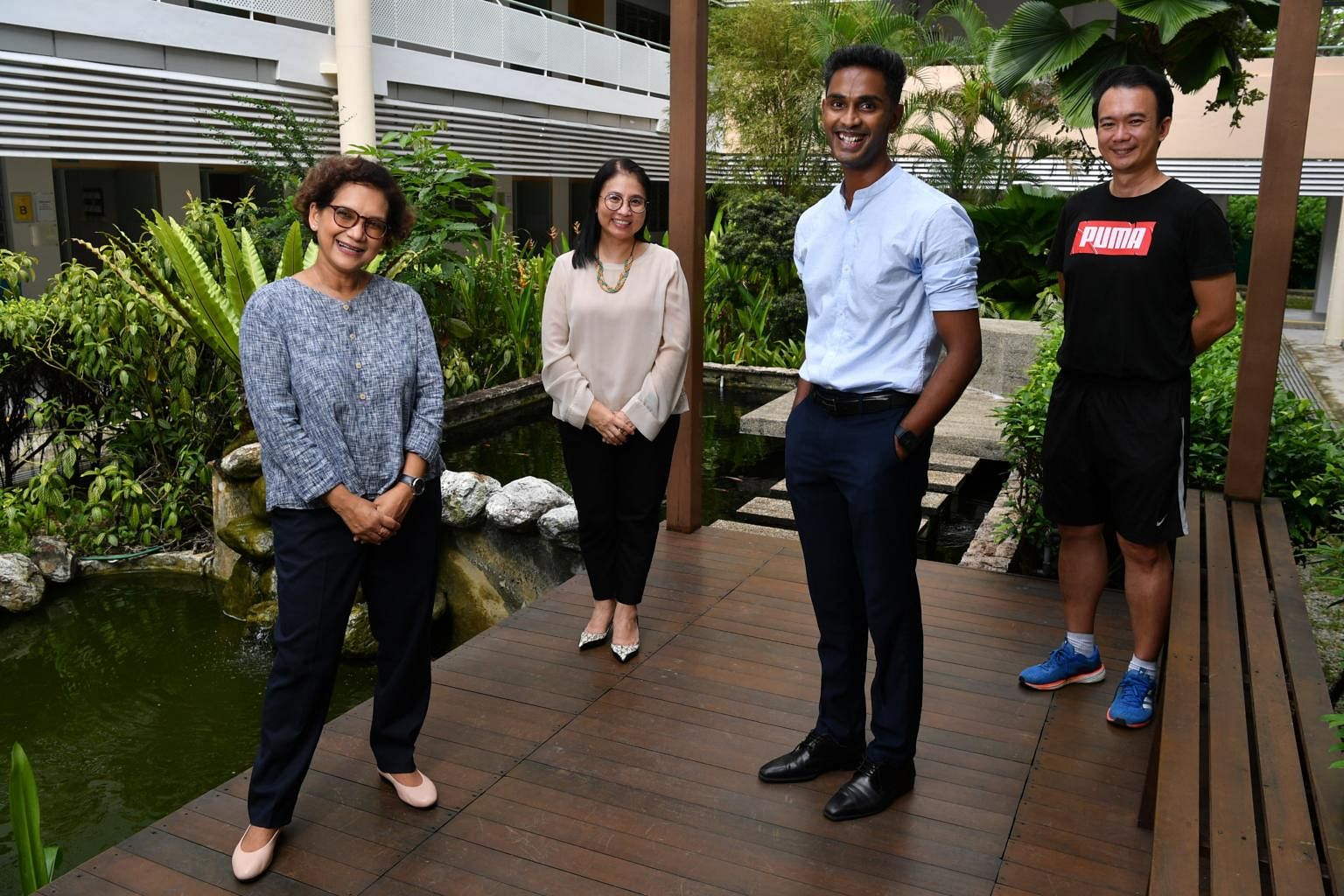
Mrs Selva added: "There are very good role models in the class, no matter which stream the students are from. Good behaviour is learnt through role modelling."
Principal Tan Hwee Pin added that full SBB aimed to offer students a greater choice in pursuing subjects that better matched their strengths and interest and the positive effects of social mixing that was observed came as a bonus.
Parents whose children in Gan Eng Seng School are in full SBB classes said it prepares their children for life.
Housewife Ting Pheck Lian, 53, whose daughter Hui Xian is a Sec 2 student from the Normal (Academic) stream, said: "We don't segregate people by different streams in life. We don't ask someone if they are from Express or Normal (Academic) before we make friends. We make friends because we like this person or have the same interest."
Raouf's father, Mr Naif Bamadhaj, 37, said "it's about time" full SBB is rolled out to other secondary schools.
"It is just like how we meet different people from different walks of life and academic levels," said Mr Naif, who is self-employed.
"We learn to appreciate one another's strengths and weaknesses."
Customising educational journey based on strengths and interests
• By 2023, about 90 schools would have implemented full SBB, including 31 secondary schools which came on board full SBB this year. The rest of the secondary schools will come on board in 2024.
• The Express, Normal (Academic) and Normal (Technical) streams will be removed from 2024.
• Subject levels will be known as G1, G2, G3 (G stands for General), which are broadly mapped from today's Normal (Technical), Normal (Academic) and Express standards respectively. Students will have greater flexibility to take different subjects at a more or less demanding level if they meet the eligibility criteria, based on their strengths, interests and learning needs.
• From 2024, MOE is also extending full SBB to three schools which currently offer only the Express course. Crescent Girls' School, Tanjong Katong Secondary School and Tanjong Katong Girls' School will admit Sec 1 students taking mainly G2 or G3 subjects.
-The story is produced in partnership with the Ministry of Education.
